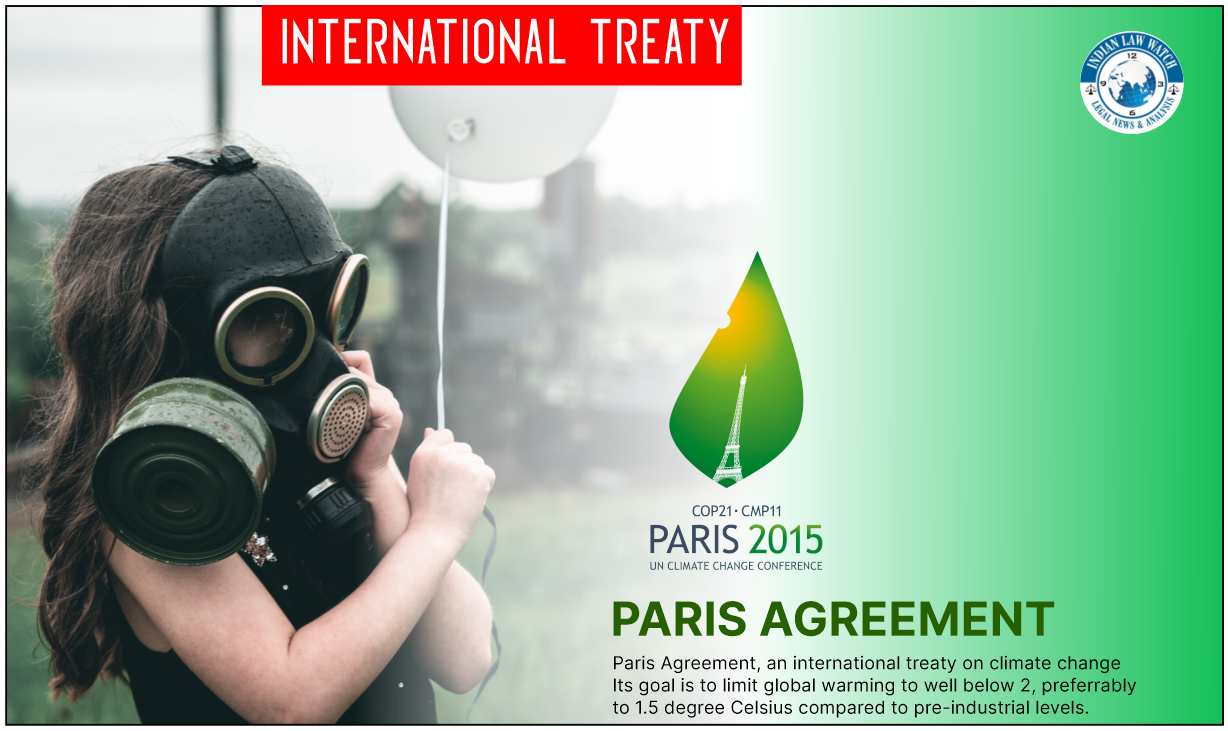

- Legally binding: The Paris Agreement is a legally binding international treaty on climate change. It was adopted by 196 Parties at COP 21 in Paris, on 12 December 2015 and entered into force on 4 November 2016. Its goal is to limit global warming to well below 2, preferably to 1.5 degrees Celsius, compared to pre-industrial levels. India is responsible for 4.10% of the GHG for ratification and signed the agreement on 22 April 2016.
The Paris Agreement is a landmark in the multilateral climate change process because, for the first time, a binding agreement brings all nations into a common cause to undertake ambitious efforts to combat climate change and adapt to its effects.
- Nationally Determined Contributions: The Paris Agreement works on a 5- year cycle of increasingly ambitious climate action carried out by countries. By 2020, countries submit their plans for climate action known as nationally determined contributions (NDCs). In their NDCs, countries communicate actions they will take to reduce their Greenhouse Gas emissions in order to reach the goals of the Paris Agreement. Countries also communicate in the NDCs actions they will take to build resilience to adapt to the impacts of rising temperatures.
- Long-Term Strategies: To better frame the efforts towards the long-term goal, the Paris Agreement invites countries to formulate and submit by 2020 long-term low greenhouse gas emission development strategies (LT-LEDS).
- India’s target: “India’s domestic target of 450GW renewable energy means that in less than 10 years, renewable energy will account of for 57 per cent of the country’s installed capacity, and 40 per cent of the generated electricity as per data available in various media. Under the Paris agreement, India has committed to cut greenhouse gas emissions intensity of its gross domestic product 33% to 35% by 2030, increase non-fossil fuel power capacity to 40% from 28% in 2015 and substantially boost forest cover to reduce carbon dioxide.
- Implementation Committee: The “Apex Committee for Implementation of Paris Agreement (AIPA)” with the secretary of the Ministry of Environment, Forest and Climate Change (MoEFCC) as its head, was notified by the government on November 27. The government of India has created a national-level panel which would interact with officials across the government departments, technical experts, civil society leaders and other stakeholders to drive a coordinated approach to the nation’s climate change goals under the 2015 Paris Agreement.
- Litigation related to Paris Agreement: Ridhima Pandey, from the Uttarakhand region, filed a litigation in March 2017 with the National Green Tribunal of India relating to India’s commitments under the Paris Agreement, and India’s existing environmental laws and climate-related policies oblige greater action to mitigate climate change. It also argues that the term “environment,” as used in the Environment (Protection) Act 1986, necessarily encompasses the climate. This application seeks direction to assess the climate related issues while appraising projects for grant of environmental clearance. Further direction is to prepare targets or a carbon budget for the total amount of CO2 emissions that can be released until 2050 ensuring that India shares its responsibility as member of the global community to achieve global climate stabilization and reduce atmospheric CO2 to below 350 ppm by 2100, limiting the long-term average global temperature increase to no more than 1°C and direct that a time bound national climate recovery plan be prepared within the existing legal framework that includes interim CO2 reduction targets and mitigation actions tiered to achieving India’s carbon budget.Howver, while issuing the following order- In this view of the matter, we do not consider it necessary to issue any direction under section 14 and 15 of the National Green Tribunal, Act, 2010. There is no reason to presume that Paris Agreement and other international protocols are not reflected in the policies of the Government of India or are not taken into consideration in granting environment clearances. It also observed
- NGT was of the view that the authorities acting under the Environment (Protection) Act, 1986, have to perform their obligation of impact assessment as per statutory scheme which is not under challenge.
- The issue of climate change is certainly a matter covered in the process of impact assessment.
- India is third largest emitter: The petition notes that India is the third-largest national emitter of greenhouse gases (behind China and the U.S.) and among those countries that are most susceptible to adverse climate change impacts.





